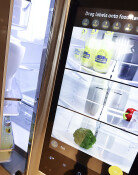Controlling Hot Money
The Bank of Korea raised its key interest rate by 25 basis points to 2.5 percent Tuesday to curb mounting inflationary pressure. The hike came after three months of freeze. Uncertainty surrounding the foreign exchange rate has been reduced following the G-20 summit in Seoul, allowing the central bank leeway to focus on maintaining price stability.
Korea is facing growing inflationary risk, with the rise in consumer prices hitting a 20-month high of 4.1 percent last month, surpassing the central banks target of 3 percent. Bank of Korea Gov. Kim Choong-soo said, Though we raised the interest rate today, our monetary policy stance still can be said to be accommodative," hinting at another hike early next year.
A widening rate gap with other countries invites more foreign capital inflow, which in turn leads to the formation of asset bubbles. The inflow of U.S. dollars makes the Korean won stronger, worsening the price competiveness of exporters. Despite rising inflationary pressure, the bank froze the rate last month amid the wons ascent against the dollar.
The U.S. Federal Reserve Board early this month purchased 600 billion dollars worth of Treasury bonds in its second round of monetary easing, raising fears of speculative foreign capital flowing into Korea. Foreign investors posted net purchases of 9.45 trillion won (8.3 billion dollars) in Korean stocks and bonds last month, nearly three times higher than the monthly average of 3.22 trillion won (2.8 billion dollars) recorded between January and September this year.
Simply strengthening the monitoring of speculative capital inflow is insufficient. Hot money can escape the country any time regardless of domestic conditions and damage the domestic stock and currency markets. The Korean government must promptly and properly regulate foreign capital flows. Collaboration with China, Australia, India and Vietnam is also crucial. These countries have raised their key rates to curb rising inflationary pressure and are guarding against hot money inflows.
The Korean won will continue to appreciate given a variety of factors. Nomura Financial Investment of Japan said Korea should allow its currency to appreciate to curb its excess current account surplus and inflation. Seoul will announce support measures for smaller exporters later this month, but such companies must also make an effort to boost their competitiveness should economic conditions worsen. Industrial Bank of Korea President Yun Yong-ro said, Next years average won-dollar exchange rate will range from 1,020 to 1,080. CEOs should remain vigilant since currency is a crucial variable to their businesses.
Headline News
- Joint investigation headquarters asks Yoon to appear at the investigation office
- KDIC colonel: Cable ties and hoods to control NEC staff were prepared
- Results of real estate development diverged by accessibility to Gangnam
- New budget proposal reflecting Trump’s demand rejected
- Son Heung-min scores winning corner kick







